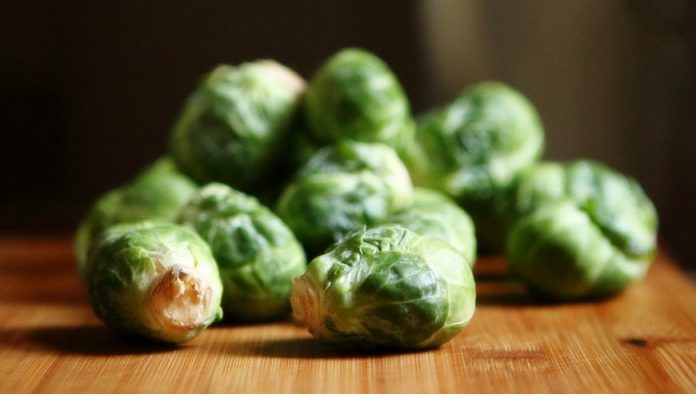Brussels sprouts look like miniature versions of cabbage. In reality, there is more to Brussels sprouts than being cute, baby-sized cabbages. They are nutritional powerhouses that offer tremendous health benefits. Plus, they are also safe for anyone to eat. But what about dogs? Can you give your pet Brussels sprouts from time to time?
We all know that veggies are good for our fur babies as they are for us. However, it is rare to find a dog that truly devours his vegetables. Besides, we have to consider that canines have a different digestive system than ours, so some veggies aren’t really that wholesome for them. It is crucial to know whether Brussels sprouts are canine-friendly or not, before even thinking of serving them to dog.
Can Dogs Have Some Brussels Sprouts?
Yes. Brussels sprouts are fine for dogs. But just like with anything, you have to offer these cruciferous veggies in moderation otherwise, your dog will experience unlikely side effects. He may end up gassy after eating too much of them.
Brussels sprouts are notorious for causing gas to build up in our intestines and this also applies to dogs. Too much of these veggies make you fart because they contains complex sugars called Raffinose. According to The Naked Scientists, this sugar is also present in the brassica family of vegetables that includes broccoli and cabbage.
In case you haven’t tried feeding your dog some veggies, you may want to start doing it little by little. Take some time to observe how he reacts to them. He might like them, as some canines do. On the other hand, he might resent them. If he hates the veggies, don’t force your pet to eat them. It is actually rare to find a doggie that would choose a cup of veggies over dog cookies or kibbles.
Benefits of Brussels Sprouts to Canines
Well-known clinical nutritionist and doctor of natural medicine Dr. Axe emphasized the importance of adding Brussels sprouts to one’s diet. A cup of this veggie is enough to meet your daily vitamin C requirement. If you feel like your dog can also greatly benefit from Brussels sprouts, consider adding them to his diet too. Below are all the components of Brussels sprouts, and how essential they are for dogs.
Vitamin K – according to the WHFoods, a cup of cooked Brussels sprouts covers as much as 243% of vitamin K. This vitamin, usually present in green leafy vegetables, is important for the blood-clotting process. In humans, vitamin K is given to those with uncontrolled bleeding. In dogs, it is also used for treating bleeding disorders. In most cases, a treatment with vitamin K is administered to dogs that accidentally ingested rat poison.
Folate – a cup of Brussels sprouts contains 23% of folate. Like us, dogs also need folate for cell replication and growth. It is not necessary that you give your dog a folic acid supplement because this vitamin is present in many foods.
Potassium – for every 156 grams of these veggies, dog gets around 14% of potassium. Your dog’s body needs it to maintain a proper fluid function. It is necessary for keeping his nerves and enzymes healthy. When your dog vomits or suffers from chronic diarrhea, he may lose an excessive amount of potassium. Thankfully, you can supply him with enough potassium because it can be found in many vegetables including Brussels sprouts.
Manganese – when your dog eats a cup of these veggies, he already gets around 18% of manganese. Canines need this micro-mineral so they can have healthy nerves as well as the normal growth of their bones. Manganese plays an important role in regulating blood sugar. The Royal Canin expressed the importance of manganese in puppies and in senior dogs with osteoarthritis.
Fiber – Brussels sprouts are a good source of fiber because each cup contains around 16% of this dietary mineral. Fiber is crucial for your pet’s digestive process. You have to make sure dog is getting enough fiber so the food easily passes through his digestive tract.
Vitamin B6 – this vitamin, also known as Pyridoxine, is essential for brain development and red cell production. It plays a significant role in maintaining sodium and potassium in a dog’s body. Brussels sprouts are among the few green vegetables that naturally contain Pyridoxine. It is commonly found in poultry and in starchy foods such as potatoes.
Protein – while Brussels sprouts are not an excellent source of protein, they still have around 8% of this macronutrient. Proteins build and maintain muscle in dogs. Your pet also needs it for healthier body tissue functioning.
Vitamin C – although animals don’t need vitamin C as much as humans do, it does not mean you can totally ditch this vitamin. Brussels sprouts boast a decent amount of vitamin C, with as much as 129% per every cup! Your pup can still benefit from this veggie’s natural antioxidant properties.
Iron – a cup of these veggies has 10% iron. Without enough iron, your dog will look weak and unable to focus. Iron deficiency in dogs can even lead to anemia. Iron works by carrying oxygen in the hemoglobin of red blood cells in the body. This way, your pup’s cells can easily produce energy.
Omega-3 fats – like humans, canines also need a good dose of healthy fats in their diet. One of the good things you can find in Brussels sprouts are omega-3 fats, which account for 11% per cup. In puppies, omega-3 fats help in developing their brain and vision. In senior dogs, these fatty acids can manage the inflammation of joints.
Copper – for every cup of Brussels sprouts, your dog gets around 14% of copper. This mineral is important in the production of red blood cells. Without enough copper, your dog’s nerve cells will not function properly. Canines need around 3.3 mg of copper for every pound of dog food they consume. If you are trying to limit your pet’s dog food intake, you may consider offering him Brussels sprouts as a healthy alternative.
Calcium – a cup of Brussels sprouts has around 6% of calcium. You already know that calcium is necessary for building strong bones in humans and animals. But more than that, calcium is also essential for keeping dog’s teeth, nails, and coat healthy. Canines need an adequate amount of calcium every day for their proper nerve function.
Zinc – a serving of Brussels sprouts has only around 5% of zinc. But that should not be a concern because canines only need a tiny amount of zinc to survive, compared to humans. Zinc toxicity is quite common among small breed dogs although there are certain breeds, like the Huskies and Malamutes that need more of it. With a reasonable amount of zinc in their diet, dogs can do better because it works hand in hand with other nutrients for essential body functions.
Choosing Brussels Sprouts For Your Dog
If you are not used to cooking Brussels sprouts, you might just pick whatever is on the market stand. However, some Brussels sprouts may be past their prime especially if you are buying from the frozen section of the supermarket. When you happen to pass by the grocery or the farmer’s market and see some Brussels sprouts, take note of these tips before buying them:
1.Buy those with a vibrant green color. The bright green heads of the Brussels sprouts indicate their freshness.
2.Avoid those with yellow or wilted leaves. A change in the leaf color suggests that the Brussels sprouts have gone bad.
3.Select the smaller ones if you want them to be sweeter. The bigger ones actually taste like cabbages. If you want your sprouts to be tenderer, buy those sprouts that have smaller sizes.
4.Look for tightly packed leaves. Fresh Brussels sprouts are supposed to have firm leaves with a heaviness that is appropriate for their size.
5.Don’t buy Brussels sprouts with dark spots, as they may have been infected with a fungus.
Take note of three things when selecting Brussels sprouts: color, firmness, and weight. Your vegetables should have no other color than bright green and they should be firm and intact.
If you happen to have bought a lot of Brussels sprouts, consider refrigerating them but don’t wait a couple of weeks before eating them. In most cases, Brussels sprouts can be safely consumed from the fridge for not more than seven days.
Best Ways to Serve Brussels Sprouts For Your Dog
Preparing Brussels sprouts for your pooch is easy and quick. It should not take you more than 20 minutes! The best part is that you don’t have to spend a lot because you don’t need to add anything. But if you want to level things up without compromising your furry friend’s wellness, a pinch of salt will be enough to add some taste.
When preparing human food for dogs, remember this one rule of thumb: the simpler, the better. You can totally ditch seasonings like pepper because it is not good for dog. Below are various ways to serve Brussels sprouts to your pet:
- Steamed – steaming veggies is the best way to eat them because this process retains most of the nutrients. If you have a vegetable steamer, simply follow what its directions. For regular steaming, place the vegetable in a saucier with water. You may add just a bit of kosher salt for taste.
- Boiled – when boiling Brussels sprouts, it is important to wait for not more than 15 minutes so the vegetable will be tender enough for eating. To know if they are ready, simply stick a fork in them. If you don’t want them to be too tender for your doggie, simply put the sprouts in boiling water for around 10 minutes and drain.
- Microwaved – if you want to steam your veggies in the microwave, put them in a microwave-safe canister and add some water. Microwave for around 10 minutes or until the sprouts are tender.
Avoid giving raw Brussels sprouts to your dog because he might have a hard time breaking them down. Raw vegetables could also cause stomach problems in canines. Don’t forget to rinse off the sprouts in cold water to make sure they are free from dust and dirt.
Remove the tip of the stem using a small knife. The yellowing outer leaves are not meant to be eaten. When the leaves are yellow, it is actually a sign of age. Brussels sprouts can be stored in the fridge for one week, given that they are well-kept in a plastic bag.
Slice each sprout in half to make it easier for your pup to chew. Don’t overcook the vegetables because doing so lessens its nutritional benefits. You may add a bit of olive oil for a slight upgrade.
Olive oil is a vet-approved addition to any dog’s diet. Many dog owners are now giving olive oil to their pets because of its amazing health benefits. One of these benefits is that olive oil helps your pet have a healthier coat. It is fine to use as much as a teaspoon of it for every 20 pounds of dog weight.
Conclusion
Brussels sprouts are one of the dog-friendly vegetables, as long as they have been cooked in the simplest way possible. This means they should not have seasonings or garlic that could harm dog. Some recipes call for ingredients like balsamic vinegar and honey. While these are good for you, they are not really suitable for doggies.
There are different ways to serve these vegetables to dogs: steamed, boiled, or microwaved. Just don’t give them raw because it will be difficult for your pet to chew. Although they could make your pooch gassy, the pros outweigh the cons because these veggies are nutrient-dense.
The key to a successful feeding is giving anything in moderation and that includes veggies. Adding Brussels sprouts to dog’s diet would not hurt but if you have a dog with sensitive stomach, it’s best to consult your vet or a pet nutritionist before giving him any.























